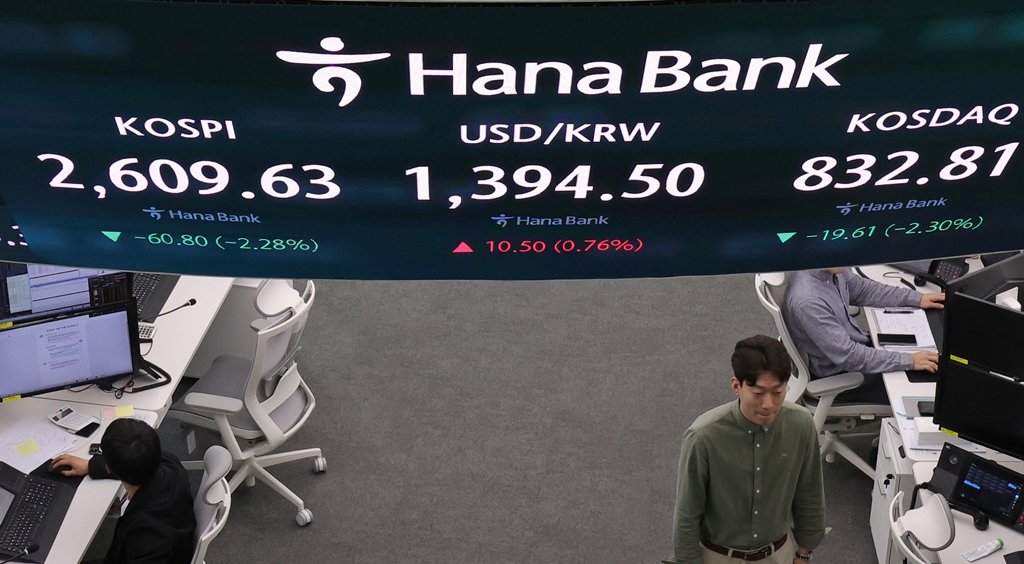The South Korean won currency on Tuesday fell to its weakest level in 17 months, briefly touching the psychologically important 1,400 per dollar level, as foreign investors sold the country’s assets on the growing concerns over a wider Middle East conflict and expectations of the US Federal Reserve’s slower interest rate cut.
The won lost as much as 1.1% to 1,400 per dollar, the weakest since Nov. 7, 2022, in the domestic foreign exchange market. The South Korean unit has weakened past the 1,400 level only during the Asian financial crisis in 1997-98, the global financial crisis in 2007-08 and the global rate hike campaign led by the Fed in 2022.
Once the local currency was at risk of breaking through the level, South Korea’s foreign exchange authorities were suspected of selling the US currency with their first official warning of the local currency’s sharp depreciation since September 2022, currency market participants said.
“The foreign exchange authorities are closely watching the currency’s movements, supply and demand dynamics in the foreign exchange market and other factors with special vigilance,” said Oh Kum-hwa, chief of the Bank of Korea’s international department, and Shin Joong-beom, head of the Ministry of Economy and Finance’s international finance bureau. “Excessive herd behavior in the foreign exchange market is undesirable for the local economy.”
After the warning and suspected currency intervention, the won ended the local currency market down 0.8% at 1,394.5, the weakest close in 17 months, extending its losing spree to seven straight sessions.
FED, ISRAEL-IRAN CONFLICT
Such weakness came after data showed US retail sales rose a seasonally adjusted 0.7% in March from the previous month, significantly faster than a consensus forecast for 0.3% growth, dampening hope that the Fed will cut interest rates.
The dollar index, the greenback’s value against a basket of six major currencies hit a five-month high with the Japanese yen’s drop to a 34-year low.
The won came under further pressure amid escalating tensions in the Middle Eas, with the intensifying Iran-Israel conflict pushing up oil prices. South Korea is the world’s fifth-largest crude oil importer.
“The won depreciated more than the dollar’s overall strength due to the geopolitical situations in the Middle East as Korea heavily relies on oil imports,” BOK Monetary Policy Board Member Cho Yoon-je told reporters.
The intensifying escalations in the Israel-Iran conflict are likely to further ramp up oil prices, increasing inflationary pressure in the South Korean economy.
That is expected to cause the BOK to delay interest rate cuts further, which is needed to boost the ailing Asia’s fourth-largest economy, economists said. BOK Governor Rhee Chang-yong on April 12 said it may be difficult to slash borrowing costs in the second half if oil prices rise further, keeping inflation higher than expected.
FOREIGNERS DUMP STOCKS, BONDS
Foreign investors sold South Korean stocks and bonds, given such bearish factors.
They sold a net 284.1 billion won ($203.8 million) worth of stocks in Seoul’s main market, pushing down the Kospi by 2.3%, according to the Korea Exchange. The benchmark index underperformed its regional peers such as the Nikkei 225 in Japan, which fell 1.9% and the Hang Seng Index in Hong Kong, which lost 2.1%.
Foreign investors also dumped a net 2 trillion won in South Korean government bond futures, pushing up bond yields across the board.
The most liquid three-year treasury bond yield rose 2.9 basis points (bps) to 3.469%, while the five-year debt yield also grew 3.8 bps to 3.532%, according to the Korea Financial Investment Association.
WON TO DEPRECIATE FURTHER
The won is expected to weaken further in the near term, analysts said.
“The currency market has become more volatile as expectations of the Fed rate cut eased. So, the won could depreciate to 1,420 in the second quarter,” said Park Sooyeon, an economist at Meritz Securities Co. in Seoul.
But the currency could soften to 1,450 if foreign exchange authorities do not intervene, Park added.
Hana Securities Co’s economist Chun Kyu Yeon expected the won to weaken past the 1,400 line in the near term as the intensifying conflict in the Middle East will push up oil prices. Korea Investment & Securities Co.’s researcher Moon Da-woon predicted the won to depreciate to 1,440.
The won is unlikely to stay weaker than 1,400 for the long term, economists said, however.
HI Investment & Securities Co.’s economist Park Sang-hyun said the won is not on a long-term depreciation trend, considering economic fundamentals.
BOK’s Cho agreed with him.
“The current account surplus is improving, while overall fundamentals including foreign exchange reserves are not that bad,” Choe said. “The overall economic situation is not of concern.”
Write to Dong-Wook Jwa and Jin-gyu Kang at leftking@hankyung.com
Jongwoo Cheon edited this article.







